How KKL transformed Ugandan football
The Kampala Kids League received plaudits for its precise organisation by bringing together hundreds of parents and children from every part of Kampala.
UGANDAN FOOTBALL
When the Kampala Kids League (KKL) was formed in 1998 by a long-standing British resident of Kampala, Trevor Dudley, no-one knew how much impact it would create.
But the league that took Kampala by storm would go on to create a foundation for most of Uganda's current stars that ply their trade with different teams in and outside the country.
It also led to the creation of other junior leagues like the Shell Under-16 Tournament, which would go on to absorb players from the KKL. A number of ‘football academies' have since sprung up in all parts of the country.
The KKL received plaudits for its precise organisation by bringing together hundreds of parents and children from every part of Kampala, consequently changing the social scene of Kampala.
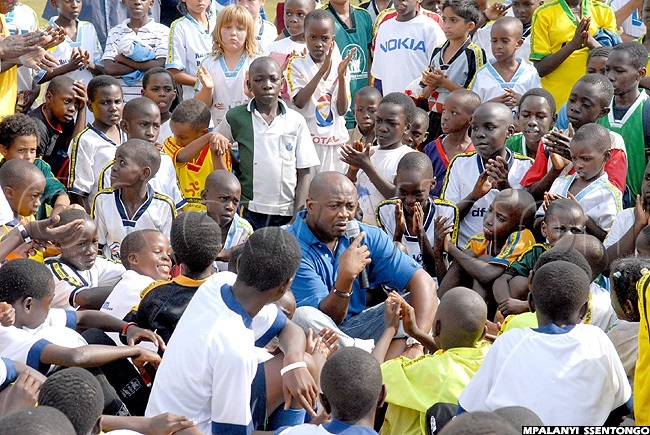 Ghanaian football legend Abedi Pele talks to KKL players before presiding over a prize-giving ceremony at Aga Khan in 2007
Ghanaian football legend Abedi Pele talks to KKL players before presiding over a prize-giving ceremony at Aga Khan in 2007
After visiting one local school outside of Kampala, Dudley realised that there was a need to add to the time that was being dedicated to sports after noting that most schools were devoting almost all their time to academics due to academic pressures and/or logistical problems with equipment and transport.
At the time, having worked in Uganda for ten years (since 1988), the chartered quantity surveyor drew experience from his school days, where sport was an important part of the all-round education, producing fit, healthy children and developing team spirit and leadership.
Working with his friend Lesley Magnay, who had a sports and administration background, Dudley contacted the then National Council of Sports (NCS) general secretary Abbey Lutaaya, who supported the idea of setting up the KKL.
After talking to NCS, schools and the State minister for education, an outline plan was formed and eventually a framework structure and master plan was developed.
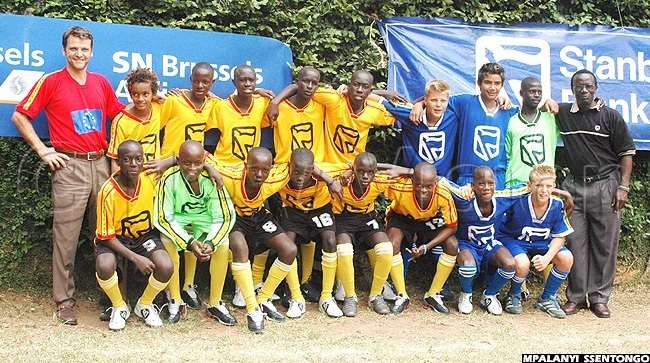 KKL U-14 team pose with their sponsors SN Brussels country manager Pierre Declerck (extreme left) and Stanbic Bank's Daniel Nsibambi (extreme right) before starting their trip to Europe to compete in the Gorthia and Tivoli Cups
KKL U-14 team pose with their sponsors SN Brussels country manager Pierre Declerck (extreme left) and Stanbic Bank's Daniel Nsibambi (extreme right) before starting their trip to Europe to compete in the Gorthia and Tivoli Cups
Dudley had 18 years before run a similar programme in Jordan that was sponsored by Grindlays Bank. The then-managing director of Stanbic Bank, John Murray Miller, right away agreed to sponsor a league run along the same lines as the one in Jordan. So with this initial financial support in place as well as the backing of NCS and local schools, Dudley and Lesley were able to get KKL off the ground.
The informal surveys revealed that football would be the most popular sport to start with, but they would later take on other sports like basketball and cricket.
Following visits to many schools, over 250 boys and girls aged between 5-13 registered for the first season. Rainbow International School offered their sports fields for KKL use. The league hierarchy would then go on to convince different sponsors to sponsor their 18 teams, with three leagues played out between September and November 1998.
Many volunteers were required to run the league successfully, as each team required a coach and an assistant, team parents, referees, scorers, administrators and officials, whose roles were duly provided by the parents to make it a very familiar affair.
KKL had ensured right from the start that the original philosophy of promoting sporting skills, team spirit, fun and activity for children is maintained through the concept of volunteerism.
In the first 10 years since its inception, the league grew extensively, with 50 leagues organised, introducing over 14,000 boys and girls aged 4-14 from over 150 different schools, orphanages, and street children organisations to organised fun and sporting activities.
Over 3000 trained volunteers helped the children understand the benefits of sports and also aided them improve their lives socially, physically and physiologically.
The KKL boys would then travel to Europe in 2002 and win the U-13 Tivoli and Gothia Cups.
They followed it with more successes over the following years, giving an opportunity to the Ugandan youngsters to compare their talents with their counterparts from all over the world.
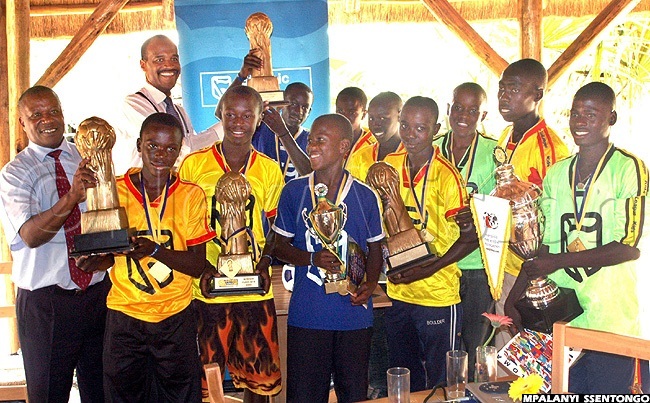 Stanbic Bank managing director Kitili Mbathi (third left) and NCS general secretary Jasper Aligaweesa receive the victorius KKL team at Mamba point in Kampala in 2006. The team had won the Gorthia, Tivoli and Football Festival tournaments in Europe
Stanbic Bank managing director Kitili Mbathi (third left) and NCS general secretary Jasper Aligaweesa receive the victorius KKL team at Mamba point in Kampala in 2006. The team had won the Gorthia, Tivoli and Football Festival tournaments in Europe
By 2007, the league had produced stars such as Anthony Papira, Emmanuel Magembe, Dennis Guma, Juma Balinya, Marco Kostic, Nemanja Kostic, Rashid Ayub, Rasuli Mpagi, Moses Ssali, Gift Ali, Sadat Bbale, Sami Alam, Mike Mutyaba, Stefan Andersen, Almanzan Magambo, Dorian Klonaridis, Tawun Gregory, Moses Oryema and Maxime Van Pee.
Of these, some like Juma Balinya, Gift Ali and Mike Mutyaba are still featuring for Uganda Premier League sides Police and KCCA FC. Maxime Van Pee has since taken on motocross and is the captain of the national team.
In 2012, Dorian Klonaridis completed a move to the 2011 French Ligue 1 champions Lille from Greek side AEK Athens. Lille paid 800,000 euros (sh2.5bn) to sign Klonaridis, who featured in the Champions League the following season.
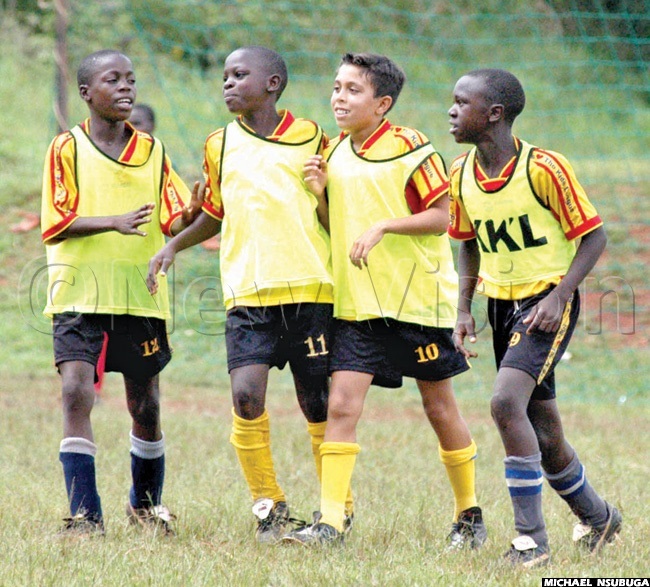 KKL boys, including Saddam Juma (right), celebrate one of their goals against KCC youth, scored by Dorian Klorianidis (2nd right) during a national youth league match at City High ground in 2003. KKL won 3-2
KKL boys, including Saddam Juma (right), celebrate one of their goals against KCC youth, scored by Dorian Klorianidis (2nd right) during a national youth league match at City High ground in 2003. KKL won 3-2
Klonaridis, a Greek-Belgian national, became the first KKL player to make it to the biggest competition in club football.
He first joined a KKL Euro tour in July 2003, and went on to establish himself as one of the best players. Many other KKL products have shined for different teams at the club level.
With coach Eddie Butindo and his assistant Alex Matovu and team leader George Klonaridis, KKL reached many milestones with the young players, winning the Tivoli Cup and Gothia World Youth Cup held in Denmark six and five times, respectively - from 2002 to 2007.
They also won the Football Festival, Denmark twice in 2006 and 2007, and were winners of the Haarlem Cup in Holland and Norway Cups in 2004 and 2005.
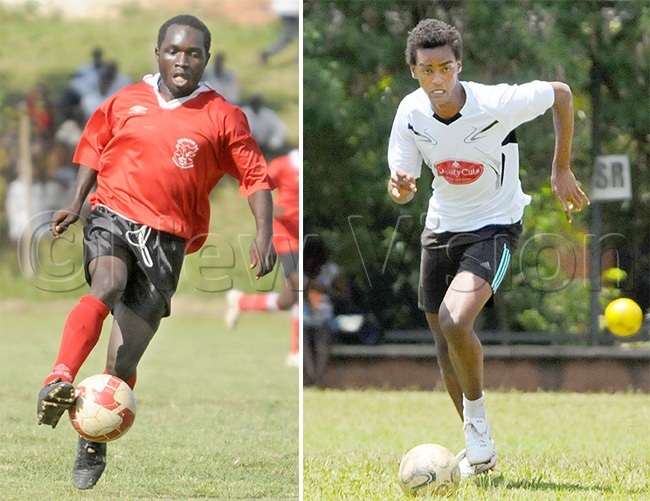 From left, Dan Sserunkuma (now at Vipers) and Maxime van Pee (now in motocross) are products of the KKL
From left, Dan Sserunkuma (now at Vipers) and Maxime van Pee (now in motocross) are products of the KKL
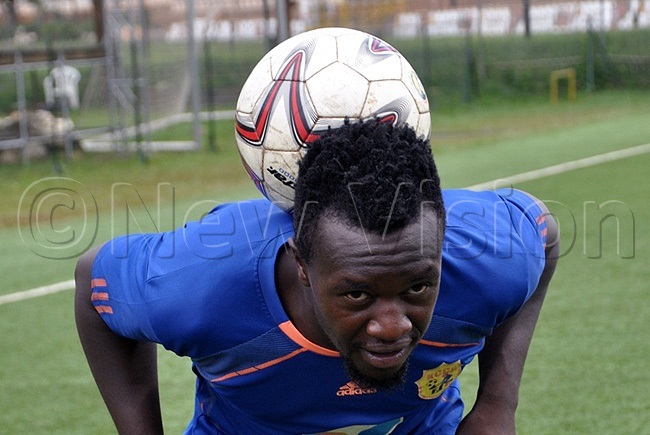 KKL product Saddam Juma is now at defending champions KCCA FC
KKL product Saddam Juma is now at defending champions KCCA FC
In 2004, other people from different districts were knocking on the door of KKL asking for similar leagues to be established in their districts, which eventually led to the formation of The Kids League (TKL).
TKL was set up to help boys and girls in the districts at grassroots level to improve their lives through sport, especially those from war-ravaged areas, and getting across health and education messages in a positive way.
Over 25,000 children from Gulu, Kitgum, Arua, Kumi, Lira, Pader, Apac, Moroto and Nakapiripirit took part in the TKL activities.
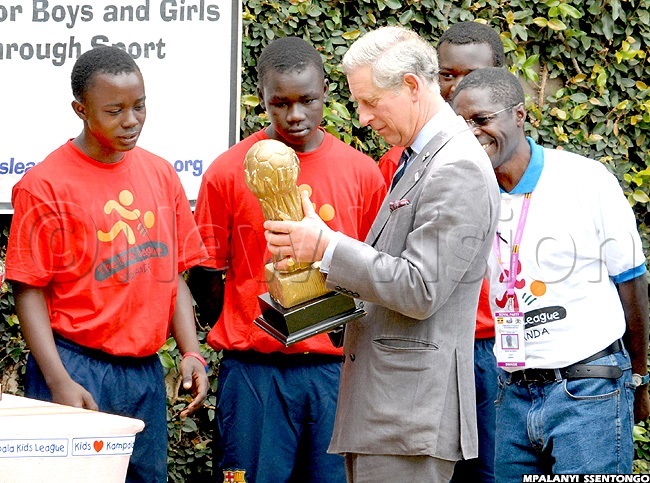 In 2007, Prince Charles checks out one of the Gorthia trophies won by KKL
In 2007, Prince Charles checks out one of the Gorthia trophies won by KKL
In November 2007, KKL was honoured with a visit by the Prince of Wales (Charles) during the CHOGM conference that Uganda hosted that year. It was his first visit to Uganda.
Prince Charles visited the offices of KKL and met all the staff and 20 boys and girls representing programms that KKL and TKL had established.
But the second coming of the KKL after Dudley retired and left the responsibility to his son did not yield much success as they were slowly losing the monopoly of organising children sporting activities.